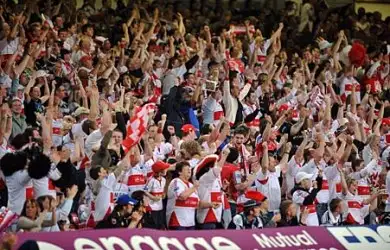Rearranging World Cup-clash games is only realistic

For rugby league supporters, the manner in which other sports register on the national consciousness is often something of an annoyance. Much less coverage will be devoted to England’s Four Nations campaign in Australia than was given to England’s World Twenty20 cricket campaign in the West Indies. At no time is this more evident than when Eng-er-land set out on another attempt to claim that elusive second soccer World Cup.
England’s soccerball internationals are perhaps unique among sporting events in that other events are habitually rearranged to avoid a clash; I remember getting the morning off school in 2002 to watch “our boys” get knocked out at the quarter-final stage. Among these rescheduled events will be rugby league fixtures: Wigan Warriors v. St Helens has been moved back by two days to accommodate England’s group fixture against Algeria, as have one or two others; more fixtures could be changed if England’s quarter-final game clashes (assuming the nation’s heroes can get that far).
Any disappointment felt because your team moves its fixtures is perfectly understandable. I’m one of those people who doesn’t really have a huge amount of interest in the World Cup – I’m disqualified as an England fan due to my tiny amount of soccer knowledge, unwillingness to be urged into patriotism by a low-quality foreign lager and inability to shout “Cam’on Englaaahhhnd!” in a throaty London accent – so I can certainly appreciate why people could be annoyed. This is especially the case if fans have other commitments for the rescheduled kick-off time, but even if – still being able to make the game – they object to the change as a matter of principle.
Yet, from the club’s perspective, it makes a lot of sense to avoid a clash with an event as big as an England World Cup fixture. While there are a large number of fans who would attend their club’s fixture anyway (many of which will allow themselves to feel superior for having done so) there are also a good number who would stay away, preferring to watch another, admittedly bigger, sporting occasion on TV. The clubs’ intention is that people won’t have to make that choice, and therefore attendances won’t suffer. If, for instance, Salford can get an extra 500-1,000 fans through the turnstiles by playing their game against Castleford on a different day then it has to be worth it from their point of view.
A forum user on TotalRL decided to gauge opinion on this, and so set out a totally objective and non-prejudiced poll which posed the question, “Should we be wendyball’s bitch?” Yet a sense of realism is helpful: whether we like it or not – and I don’t like it – rugby league is much, much smaller than the millionaires-kicking-a-ball-about tournament. As someone else on that poll pointed out, if fixtures are moved it’s not for the benefit of soccer, it’s for the benefit of rugby league clubs who can improve attendances that way. There is always the question of whether games should have been moved earlier – the World Cup fixtures have been published for some months now – but the problem of navigating the post-group stage fixtures remains nonetheless.
Does this mean we’ve somehow sold out to the monolithic colossus that is association football? I don’t think it does. If this was something we did all the time I’d disapprove; moving games to different dates to avoid clashes never works as a long-term solution. That was discovered last season when Widnes Vikings switched their home games to Fridays and Saturdays almost at random to avoid televised Premiership moneyball, only to see the third-largest drop in average attendance of all twenty-five professional clubs. Yet, as a one-off solution to a one-off problem we can’t really blame the clubs concerned for taking what they must see as the only realistic option.
Keep Your Eye on Rugby League